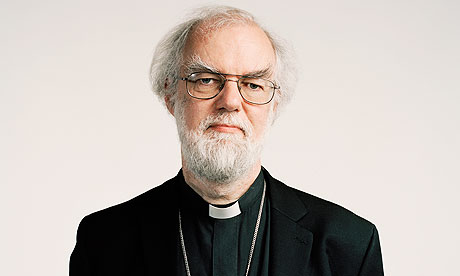![]()
Arab spring could threaten Christians, warns archbishop of Canterbury
Rowan Williams says non-Muslim communities in Middle East want to know what uprisings will mean for them

Archbishop of Canterbury, Rowan Williams, says the Arab Spring could lead to increased hostility towards Chritsians in the Middle East. Photograph: Spencer Murphy for the Guardian
The archbishop of Canterbury has warned that the Arab spring could lead to increased hostility towards Christians in the Middle East, describing their position as "more vulnerable than it has been for centuries".
In a House of Lords debate, Dr Rowan Williams said such communities faced a "painful dilemma" in the wake of revolutions across the region.
He told around 80 peers last Friday: "Under some of the discredited regimes of recent years, they have enjoyed a certain degree of freedom from aggression or discrimination.
"The first tremors of political change were felt by some Christians as a bit of a threat to a status quo that, while anything but ideal, was a bit more bearable than some alternatives.
"At the moment, most of these communities urgently want to know whether the Arab spring will be good or bad news for them, and for other non-Muslim or non-majority presences."
The region, home to millions of Christians, has seen its communities dwindle in number because of low birth rates, emigration, persecution and violence.
Williams said Christians must have a "guaranteed place" in their historic homelands and that emerging governments must commit to civic equality and the rule of law.
"The challenges to dictatorship have, just as in the Balkans, brought their own dangers and instabilities. What began as a distinctively non-sectarian set of movements has inevitably opened the door to some of those Islamic political activists who suffered repression under the old regimes.
"We wait to see exactly what agenda such groups will now want to advance as they win high levels of popular electoral support and whether this will mean new kinds of repression in which non-Muslim and, importantly, non-orthodox Muslim communities will become targets for discrimination or whether something more like the Turkish model will emerge: an openly and strongly Islamic government with, equally, a strong commitment to practical pluralism and political transparency."
He added: "This seems to be the direction in which Tunisia is moving, and we hope and pray that this may still be possible in Egypt. It is certainly not the case that we can assume that 'extremists' are poised to take over the region tomorrow, but we still need to take with utmost seriousness the anxieties that are felt by communities already feeling exposed and uncertain."
The treatment of Christian communities would be a "litmus test" of the success of the Arab spring, he added.


